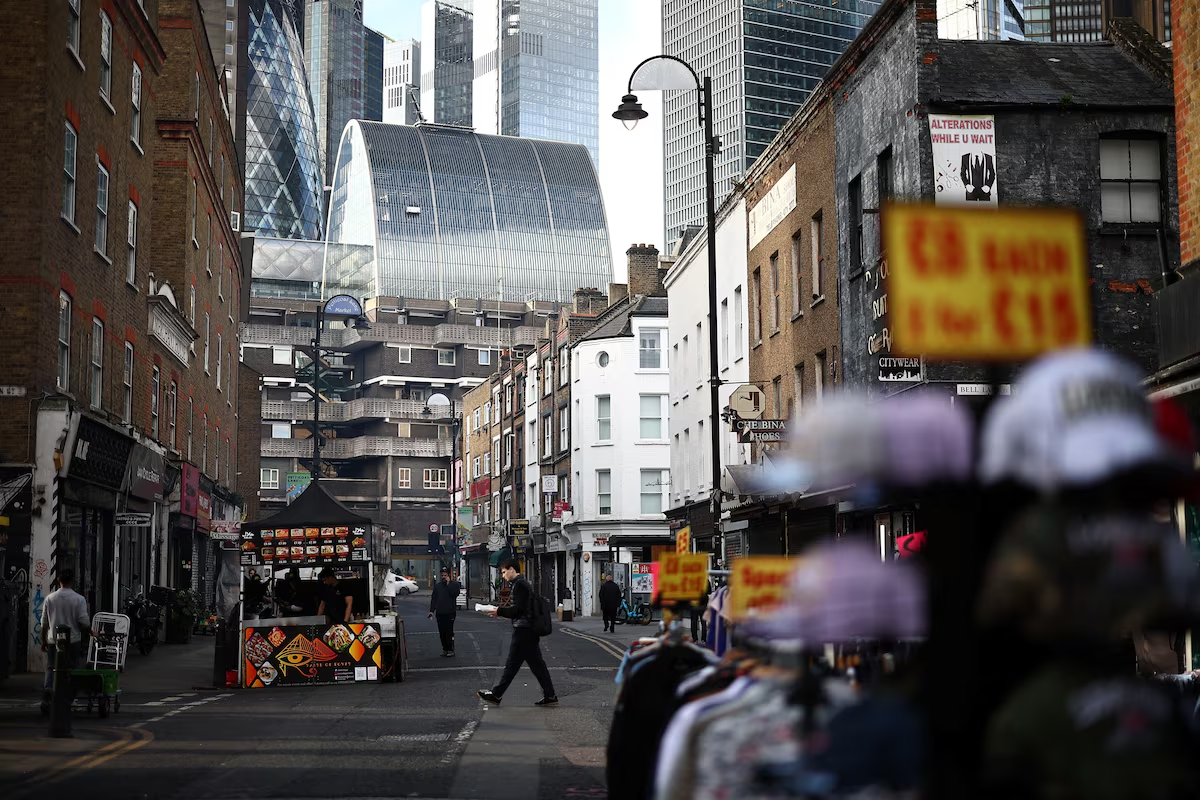Opinion: A confused Britain fidgets as it gets pushed to the brink

Open this photo in gallery:
Stalls setting up for business at Petticoat Lane market in central London on Nov. 13.HENRY NICHOLLS/AFP/Getty Images
Tom Tugendhat is a Member of Parliament in the United Kingdom and a former security minister.
The British economy has spent the past year hovering somewhere between listless and inert. Growth, that once-familiar friend, now behaves like a recalcitrant teenager: glimpsed occasionally in the hallway, never staying long enough to be useful but always promising to stay for Christmas.
Investment in the past quarter was pretty much flat, productivity is sulking and business confidence has all the buoyancy of a wet sandbag, as the Office for National Statistics confirms. The result is obvious: The U.K. has not grown. Per capita, we are up four per cent since the global financial crisis; Canada is up 22 per cent, and the United States 79 per cent.
Two forces lie behind this stagnation: the short-term chaos of regulatory volatility and the long-term capital starvation engineered by decades of restrictive pension rules. One makes businesses hesitate today; the other leaves them unable to invest for tomorrow. Together they form the architecture of the U.K. economy’s current malaise.
We should be led by a confident administration offering predictability and a steady easing of burdens. Instead we face confusion. Ministerial briefings followed almost immediately by denials have left businesses unsure how to respond. Firms can cope with high taxes, irritating regulations, even bureaucratic absurdity, but they cannot cope with constant change.
U.K. budget may be Labour’s last chance to quell rumblings of revolt, observers say
National Insurance, the tax on earned income, has yo-yoed in recent years as governments, including Conservative ones, tried to appear dynamic rather than strategic. Labour’s long-touted Employment Rights Bill has lurched in and out of view, raising fears of heavier burdens on employers. And the run-up to Chancellor Rachel Reeves’s budget Wednesday has been the most erratic yet, with proposed tax changes tested by leaks to the press then denied.
Four in five businesses have fewer than 10 workers, and any last-minute rule change can be catastrophic, so hiring and innovation are delayed. Energy regulation shifts with every new ministerial whim. Trade rules and import paperwork continue to mutate post-Brexit. Even pensions, tax allowances and capital treatment, once stable fixtures, now lack predictability.
Uncertainty breeds hesitation. A firm that might have expanded instead waits. A family that might have moved jobs pauses. Entrepreneurs delay. Investors reconsider. Consumers save. The economy slows, then creaks, then stalls. But another, deeper force has been draining its strength for decades.
In the aftermath of two major pension scandals in the 1990s, capital that once flowed into businesses – money funding innovation, expansion and hiring – came to be treated as excessively risky. Regulators pushed pension plans and insurers toward bonds, which promised safety but created little. Bonds simply track the economy rather than drive it, weakening the intergenerational contract that once channelled savings into future growth.
Tom Tugendhat: Britain needs energy. Canada has energy. Why can’t we work together and dream big?
What was intended as prudence became over time a slow siphoning of the economy’s lifeblood. The past year merely continues this long decline. Business investment is barely crawling on an annual basis and shrinking quarter-on-quarter. Productivity has risen by only half a per cent since 2010, roughly half that of Germany or Canada. Whatever the Treasury insists, this is not the profile of an economy preparing to grow.
Government points to rising tax receipts as evidence of success, but in a low-growth economy this can signal overtaxation and fiscal drag, a doom loop in which tighter control suppresses the very growth that would otherwise expand the tax base. Meanwhile, with the state spending around 45 per cent of national income, the private sector has even less room to manoeuvre. A tax system that should encourage dynamism has become a cumbersome tollgate.
Businesses need the space to take risks, to succeed, to fail and to try again; but under the current government, no one has secure footing. Risk is multiplied and the natural dynamism of the economy collapses into stasis. Put these forces together and the past year looks inevitable rather than mysterious. Investment is too low; regulation too volatile; taxes too frequently modified. Ministers announce, adjust, tinker and retreat. Entrepreneurs hesitate. Firms delay. Consumers worry. Productivity crawls. Growth flatlines.
None of this is necessary. Britain has talent, capital and ambition. Combined, they could transform our economy and empower our allies overseas. But they require something essential that Britain has not recently had: stability and long-term capital. Growth is the sum of millions of individual decisions to invest, hire, expand, save, spend and innovate. Those decisions require confidence. Confidence requires stability. And stability requires a government that understands the value of staying still and allowing capital to grow.
Until that happens, Britain will remain where it is now: waiting for growth, hoping for the best and wondering why the future keeps refusing to arrive.





